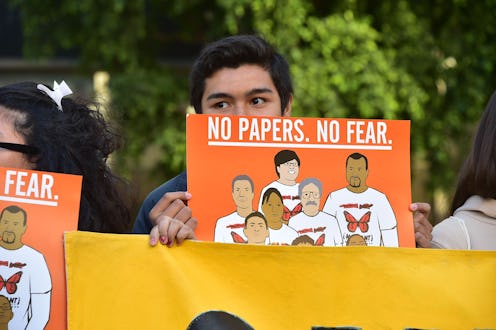
Last Wednesday, a 10-year-old undocumented child was reportedly detained by Border Patrol agents after being released from surgery. Now, the young girl is forced to recover from the lifesaving surgery without her parents by her side. In response to the situation, "Free Rosa" has been trending on Twitter, and though the hashtag is raising awareness, there are various ways you can help Rosa Maria Hernandez off-line and in real life.
Hernandez, who has cerebral palsy, was just three months old when her parents brought her from Mexico to the United States, where they thought that she would receive better medical care. In other words, she has lived in the United States nearly all of her life. But last week, Border Patrol agents reportedly intercepted an ambulance she was traveling in with her adult cousin, who is an American citizen.
She was on her way to the Driscoll Children's Hospital in Corpus Christi, Texas, where she would eventually undergo an emergency surgery on her gall bladder. After stopping them at a check point, Border Patrol agents reportedly elected to follow the ambulance, and reportedly posted up outside of Hernandez's hospital room, supposedly refusing to let doctors or family shut the door.
According to multiple reports, when Hernandez was discharged on Wednesday, Oct. 25, immigration officials took her into custody. Reportedly, they transferred her over 100 miles away, to a juvenile shelter in San Antonio. A video of the event, reportedly taken by the family's lawyer, shows the young girl being lifted out of the hospital room while still on a hospital bed.
Opponents of the decision have argued that Hernandez could not possibly have been a threat to national security, given that she is so young. But Department of Homeland Security officials have said that they were simply following the law. According to NPR, they claim that Hernandez was found at a checkpoint, not the hospital itself, making the apprehension exempt from an internal policy which discourages "enforcement actions" at sensitive locations. ("Schools, places of worship, and hospitals should generally be avoided," U.S. Customs and Border Control says on its website.) Customs and Border Protection spokesman Dan Hetlage told NPR:
The agent is wrong if he lets her go. We don't have the discretion. It's not a traffic ticket. We follow the letter of the law ... It's frustrating for us. I'm a human being. The agents are trying to do their job as humanely as possible.
If you want to help Hernandez, there are three key actions you can take.
One way to get involved is to call the Office of Refugee Resettlement and demand that Hernandez be released to her family. The American Civil Liberties Union has a page dedicated to Hernandez's case, including a form that will automatically dial the office's number from your phone. They also include a sample script that details what you should say when you are connected:
I’m calling to ask you to release Rosa Maria Hernandez back to the care of her family today. This 10-year-old elementary-school student needs to be recovering from surgery at home with her family, not jailed in a detention center. What the government is doing is outrageous and cruel.
Another way to get involved, if you're able, is to donate. There is a GoFundMe campaign that is collecting donations that will go toward legal expenses incurred by Hernandez's family while fighting her detention and potential deportation. As of early Monday morning, the campaign just passed the halfway mark of its $50,000 goal.
Thirdly, there is a petition addressed to the Department of Homeland Security's acting secretary Elaine Duke. The petition calls on Duke to close Hernandez's deportation case so that she can be reunited with her family. It also highlights the fact that Hernandez, because of her disability, reportedly has the mental age of someone half her age. It also alleges that her parents could not visit her if she is deported because they would be detained at the border.
According to The New York Times, Hernandez will eventually be released to her parents, once she is processed, but that could take weeks. Her parents are unable to visit her in her current location because they are undocumented and cannot risk traveling through checkpoints between their home in a border town and San Antonio.
If Hernandez is deported to Mexico, it's unclear who she would be left in the care of. Her parents risk legal trouble should they try to travel there, and Hernandez is a child who requires close medical attention. In the meantime, it's important to make your voice heard and let the government know that Americans don't support such gross mistreatment of children, documented or not.